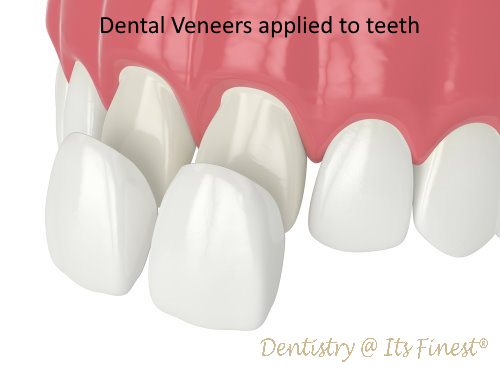Veneers are thin, tooth-colored shells that are custom-made to cover the front surface of your teeth. To improve the appearance of your smile, dental veneers are used to conceal any stains, gaps, or discolouration. Your teeth must be prepped and reshaped before you can obtain veneers. To create room for the veneers, the dentist will remove enamel from your teeth. Following the preparation of your teeth, the dentist will take an imprint of your teeth to produce a mold for the veneers. Temporary veneers are used until permanent veneers arrive. Following the preparation of the veneers, the dentist will use dental cement to glue the veneers to the teeth and a UV light to harden it. You will still need to maintain good dental hygiene once your veneers are installed.
How are dental veneers applied?
To make room for your veneers, the enamel of your teeth will need to be shaved away. For the veneer, the dentist will take an imprint of your teeth. Dentists add porcelain veneers treatment to your teeth with dental adhesive or cement. The veneers will be applied to your teeth using dental adhesive by the dentist. When the veneers have been placed on your teeth, the dentist will use a UV light to solidify the dental adhesive, ensuring that your veneers are secure.
What Should You Know About Dental Veneers?
A veneer is a thin coating that is applied to your teeth to give them a brighter appearance. Before having veneers, you should meet with your dentist to have your teeth examined. Your dentist will shave off your tooth enamel before inserting dental veneers on your teeth. To make your veneers, a mold of your teeth will be created. You will be offered temporary veneers until your permanent ones are applied. When it comes time to install the veneers on your teeth, dental cement will be placed to the veneer to help it stay in place. When the veneer has been appropriately put, your dentist will flash a UV light on your teeth to allow the dental cement to set and stay in place.
Types of Veneers
Veneers are formed of a variety of materials, which affects their look and lifetime. Porcelain veneers are classic veneers consisting of thin ceramic shells. Composite veneers are constructed from composite resin. Porcelain veneers have a lifespan of 10-15 years. Composite veneers have a lifespan of 4-8 years. Read about Veneers types and their usage.
Preparing for dental veneers
Have an appointment with a dentist before getting veneers to evaluate if veneers are correct for you. In preparing for veneers, continue to maintain good tooth hygiene. With veneers, your teeth are still vulnerable to cavities and erosion. Following getting veneers, you will need to clean and floss your teeth as usual. The dentist will need to restructure your teeth and shave down your enamel before placing your veneers. Following the preparation of your teeth, the dentist will create a mold or imprint of your teeth, which will be sent to a lab to create your veneers. You will be allowed to wear temporary veneers until your permanent veneers are ready.
Is anesthetic required for dental veneers?
Dental veneers do not require anesthesia. You can talk to your dentist about getting an anesthetic for your veneer treatment. If you are worried about pain or worry, your dentist will numb your teeth so that you do not feel any discomfort.
Is it possible to acquire dental veneers without shaving my teeth?
You can get dental veneers without having to shave your teeth. Generally, porcelain veneers necessitate tooth shaving; however, individuals with straight or little gappy teeth may not.
What kind of adhesive do dentists use for dental veneers?
Dentists apply veneers to your teeth with certified dental glues and dental cement. Ordinary glue is hazardous and should not be used for veneer reattachment. Wait until you see your dentist if your veneers need to be repaired.
What to know about Veneers besides applying on teeth?
Beyond applying on teeth, comprehensive knowledge of veneers encompasses their diverse types, including porcelain and composite. Understanding durability, the preparation process, and suitability for cosmetic enhancement, especially dental veneers for front teeth, is crucial. Additionally, insights into maintenance, potential adjustments, and how much do dental veneers cost contribute to informed decisions and successful smile makeovers.
Dr. Michael Ayzin at Dentistry At Its Finest is a dentist who specializes in porcelain veneers. Dr. Michael Ayzin takes pride in using high-quality veneers to transform the smiles of patients.

